Archive for January, 2011
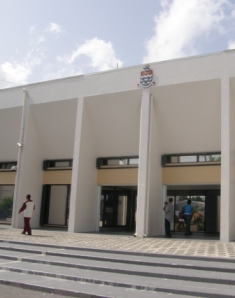
Justice delayed for lack of space, says CJ
 (CNS): The country’s senior judge has reiterated the pressing need for a new court building, as he says the lack of space means that the process of justice, especially in criminal cases, is taking too long. Although the courts are dealing with an increasing amount of criminal work and disposed of 1,344 in the Summary Courts and 100 cases in the Grand Court, Chief Justice Anthony Smellie said the time it takes to deal with them is a more important figure than the number of cases actually dealt with. He revealed that last year the average time for an indictment to be concluded in the Grand Court was more than twice the modern benchmark and the main reason for this growing delay was because there was no longer enough space to deal with the numbers.
(CNS): The country’s senior judge has reiterated the pressing need for a new court building, as he says the lack of space means that the process of justice, especially in criminal cases, is taking too long. Although the courts are dealing with an increasing amount of criminal work and disposed of 1,344 in the Summary Courts and 100 cases in the Grand Court, Chief Justice Anthony Smellie said the time it takes to deal with them is a more important figure than the number of cases actually dealt with. He revealed that last year the average time for an indictment to be concluded in the Grand Court was more than twice the modern benchmark and the main reason for this growing delay was because there was no longer enough space to deal with the numbers.
Speaking at the opening of the Grand Court last week, Smellie pointed out that the time period for justice is a crucial consideration. Last year it took an average of 348 days for an indictment in the Grand Court to be dealt with, nearly twice as long as the modern benchmark of 180 days or 6 months – a standard which, he said, the local judicial service had managed to maintain until recently.
“The average time for disposal is the crucial benchmark because it measures the length of time before an accused person knows the outcome of the case,” the CJ stated. “In many cases this will involve defendants being incarcerated in the meantime. The implications for the state’s obligation to ensure the right to a fair and timely trial are therefore clear and everything that can reasonably be done to comply with that obligation must be done.”
The obvious response, he said, would be to convene more trials simultaneously, both in the Grand and Summary Courts. With the appointment of a fourth magistrate and the assistance of justices visiting from Jamaica to serve on the Grand Court’s Criminal Division that would be possible. However, Smellie noted that securing additional judicial personnel was not the only aspect.
“Criminal trials cannot be taken in camera and … more dedicated court rooms are needed for criminal trials. At present there are only three such court rooms available and these are always being used,” he pointed out.
He said the plans for a new courthouse project had been approved by government some time ago, and while he said he was well aware of the economic concerns, as soon as was practical he asked for the project to be reconsidered.
“Given the significant amounts already spent in acquiring the land and developing the design of the building to the stage of planning approval, it is very much to be expected that the project will be allowed to proceed as soon as funding can be arranged,” the chief justice added.
Although pressure on staff had been slightly alleviated by the transfer of some business to Kirk House, he said there was an urgent need for the new building, which has been recognized and accepted by government for more than a decade now.
James Bergstrom, President of the Cayman Islands Bar Association, also backed the CJ’s call for the new building. On behalf of the profession, he said that while the recent expansion at Kirk House to accommodate the Financial Services Division and the Court of Appeal was very welcome, the need for another modern court building remained.
“While the current financial position of government may not allow for immediate development, the project that was already approved should be revitalized as soon as is possible,” he added.
During his address the CJ said that a detailed statistical report would be available to the public shortly covering the work of the courts. He revealed, however, that during 2010 in the Summary Court 1,304 criminal cases filed and 1,344 were disposed of, including 40 from the 2009 backlog. There were also a staggering 9,662 traffic cases disposed of. In the Grand Court 108 new indictments were filed and 100 cases dealt with. He revealed that 77 indictments are being carried forward into 2011 and there are 10 indictments which have been in the system since before 2010.

Fat discrimination no joke say activists
 (CBC): Obesity is one the last forms of discrimination that society readily accepts, and that’s no laughing matter, a Canadian summit heard Monday. The Canadian Obesity Network, an advocacy group that organized the conference in Toronto, is considering calling for federal legislation that would make it illegal for employers to discriminate against overweight Canadians, a move the state of Michigan has made. The network brought together some of North America’s top obesity experts and people who struggle with weight issues in what the network says is the first Canadian conference to deal with weight bias and discrimination.
(CBC): Obesity is one the last forms of discrimination that society readily accepts, and that’s no laughing matter, a Canadian summit heard Monday. The Canadian Obesity Network, an advocacy group that organized the conference in Toronto, is considering calling for federal legislation that would make it illegal for employers to discriminate against overweight Canadians, a move the state of Michigan has made. The network brought together some of North America’s top obesity experts and people who struggle with weight issues in what the network says is the first Canadian conference to deal with weight bias and discrimination.
Summit participant David Dolomont said he weighs more than 300 pounds and has faced taunts and jokes about his excess weight since childhood.
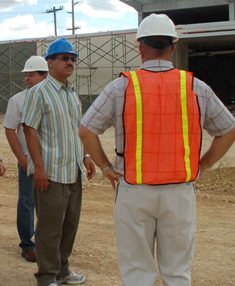
UK wanted schools stopped
 (CNS): The phasing and delay on the development of the country’s new high schools owes more to the negotiations with the UK and the three year budget plan than the government not being able to afford them, the education minister has said. Rolston Anglin revealed that during the negotiations on the three year plan, which enabled the government to increase borrowing this year, the UK was particularly interested in stopping the projects and had little sympathy, he said, for the Cayman government’s position. He said UK officials revealed school projects were being cancelled in Britain due to the need to cut public spending and they saw no reason why the Cayman projects should not be stopped as well.
(CNS): The phasing and delay on the development of the country’s new high schools owes more to the negotiations with the UK and the three year budget plan than the government not being able to afford them, the education minister has said. Rolston Anglin revealed that during the negotiations on the three year plan, which enabled the government to increase borrowing this year, the UK was particularly interested in stopping the projects and had little sympathy, he said, for the Cayman government’s position. He said UK officials revealed school projects were being cancelled in Britain due to the need to cut public spending and they saw no reason why the Cayman projects should not be stopped as well.
Speaking in the Legislative Assembly last week, the education minister said he could not go into too much detail about the financial situation with the schools because of the matters before the courts. He revealed, however, that London had wanted the projects frozen but that the phased approach was the compromise and it was not about affordability.
He added that government was committed to finishing them in a cost effective timely manner. Work has already restarted at the Clifton Hunter site, which is now expected to be completed by the end of this year, the minister said. In the meantime, things at the John Gray Campus had been organised in such a way that the country’s school children would not be disadvantaged, Anglin told the LA.
In a statement to his parliamentary colleagues, he did, however, talk at length about what he believed to be wrong with the design of the schools and said that the government had spent money re-engineering them. He criticised the modern concepts that underpinned the schools’ design, such as open space learning, and said some aspects of the design “defy logic and judgement” and that despite concerns from teachers the previous minister maintained those designs.
Anglin picked apart the idea that science and art could be taught at the same time in a large open space and pointed to the failure to provide for proper security because of a low fence, that there was no behaviour modification unit or provision for teaching home economics, despite a commercial kitchen.
“Open learning environments are a constant feature of the design of these schools,” he said. “These are schools without classrooms where different teachers and classes of students are in full view and hearing of one another.”
He saidnot only would it be very expensive but it was not agreed by all education experts that open learning, independent learning and small working groups were the best methods for all students and all subjects.
Work has begun to redesign the schools, he said, so art would not be taught alongside science, the 42’pickett fence planed for the perimeter of the school was to be replaced with a six-foot chain link fence and the CCTV would be relocated. He also said home economics and textiles would be taught in the schools in line with the UDP manifesto of providing vocational education.
The redesign inside has not provided for behaviour intervention areas, the minister stated, which was in line with his ministry’s national behaviour and discipline strategy that had reduced serious incidents and the need to suspend students by 60%. “By the end of October, 8 students were suspended in 2010 from Years 10 to 12 compared to 35 in 2009 and 51 in 2008,” he said. “This is not going soft on discipline but a focus on de-escalation, keeping the students in school rather than excluding them from all learning environments.”
Despite making some changes, the minister said it was not possible to deliver completely acoustically separate learning spaces as so much work has already been completed. Constrained from adding what he said were proper walls by fire codes and other regulations regarding air circulation, the ministry has introduced partitions.
He said the changes at the schools had been met with relief by those involved as they will not be “made to conform to a futuristic experiment where the form of the building wholly dictated its function,” he added as he continued to criticise his predecessor’s vision for change in education.
“Given the enormous burden that the building of these schools has placed on this and possibly future generations, anything short of embracing the new schools as beneficial to learning would be a national tragedy,” Anglin stated. He added that buildings don’t raise educational standards and that was why the ministry had relied upon the teachers, students and parents to guide the modifications.
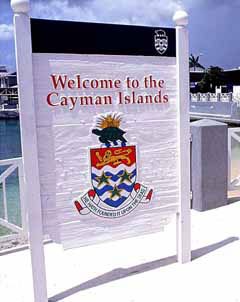
Tourism aims to be ‘kind’
 (CNS): The minister for tourism has revealed that the department is about to unveil a new marketing campaign in the USA called ‘CaymanKind’. In a statement to his colleagues in the Legislative Assembly on Friday reviewing the performance of the tourism industry over 2010, McKeeva Bush said that the year had proved to be better than 09 and the department was geared up to rebound further in the coming twelve months despite the fact that 2011 is expected to be a tough year. The sector will play a pivotal role in the revival of the economy he said adding that it was important for everyone to extend CaymanKindness to those who visit.
(CNS): The minister for tourism has revealed that the department is about to unveil a new marketing campaign in the USA called ‘CaymanKind’. In a statement to his colleagues in the Legislative Assembly on Friday reviewing the performance of the tourism industry over 2010, McKeeva Bush said that the year had proved to be better than 09 and the department was geared up to rebound further in the coming twelve months despite the fact that 2011 is expected to be a tough year. The sector will play a pivotal role in the revival of the economy he said adding that it was important for everyone to extend CaymanKindness to those who visit.
The new brand campaign in the USA is about the entire Cayman experience, Bush said.
“CaymanKind encompasses everything that makes the Cayman Islands unique – from the friendliness of our people and our rich cultural heritage to our cosmopolitan style, stunning natural beauty and warm welcome, which we extend to those who visit our shores,” he added.
The premier said that according to Trendwatching.com, which is one of the world’s most visited sources for consumer trends and insights, Random Acts of Kindness are ranked as number one when it comes to crucial consumer trends for the coming year.
“The key to our future success relies on our ability to continually adapt and grow our product base, but more importantly, it lies within each of us, in our ability to extend CaymanKindness to those who visit our shores,” he added.
He noted that following on the improvements of 2010 the growth, sustainability and economic viability of the Tourism industry would remain top priorities this year. Despite budget cuts he said the DoT would continue to work assiduously to identify new offers and further develop existing products and infrastructure.
“Competition from destinations outside of our usual competitive set like Latin America and the Gulf States is expected to increase and the playing field is likely to become much tougher than it’s ever been. In addition, we can be certain that consumers will be researching more, spending smarter and demanding more value for money which is why the DOT is placing emphasis on improving customer service standards and enhancing the visitor experience.”
The premier said that over the last year DOT had conducted over 180 PRIDE workshops in an effort to train people working in the hospitality industry – particularly those on the front line. More than 2500 ‘tourism ambassadors’ have completed PRIDE (Personal Responsibility in Delivering Excellence) workshops since it started. In addition, a pilot programme has also been developed for schools for year 11 and 12 students.
Addressing the issue of human capital development in the tourism industry Bush said that Caymanians need to be encouraged to become involved in tourism.
“I am therefore particularly pleased to note that 52 Apprentices have graduated with CARIBCERT certification and 22 new apprentices have enrolled in the 2010/11 programme,” the premier said.
As well as key marketing initiatives and promotions he said the DoT will continue to work with Cayman Airways to keep improving airlift figures. The target to reach 300,000 air arrivals for 2010 is unlikely to be met but the air arrivals are still up by around 6% on the 2009 figure of just under 272,000. With the addition of the new direct WestJet service from Toronto to Grand Cayman and return of CAL’s Chicago and Washington services the premier said the number of overnight guests coming to Cayman was considerably more than it may have been given the global circumstances.
He also revealed that private aircraft arrivals have also increased by 5 percent this December and Cayman also received an additional 18 new aircrafts this December due to an extremely cold winter in Florida.
See tourism arrival statistics here
See the premier’s full tourism presentation below
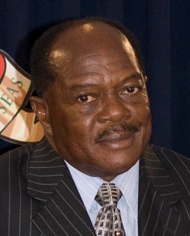
Premier reveals first recipients of ‘people’s awards’
 (CNS): Following his announcement last year and the passage of the law, the premier has named the first people who will receive the country’s newest awards. The Order of the Cayman Islands, referred to as the “people’s awards” by the country’s leader when he introduce them, has three categories: the Medal of Honour, which may be awarded at the Commander, Officer, or Member levels; the Medal of Merit category is sub-divided into gold and silver; and the Long Service Award. In the first honour roll call McKeeva Bush has awarded the medals to twenty-four people from all walks of the community, including attorney Steve McField (left), Dr Steve Tomlinson and story teller Twyla Vargas. (Photo by Dennie Warren Jr)
(CNS): Following his announcement last year and the passage of the law, the premier has named the first people who will receive the country’s newest awards. The Order of the Cayman Islands, referred to as the “people’s awards” by the country’s leader when he introduce them, has three categories: the Medal of Honour, which may be awarded at the Commander, Officer, or Member levels; the Medal of Merit category is sub-divided into gold and silver; and the Long Service Award. In the first honour roll call McKeeva Bush has awarded the medals to twenty-four people from all walks of the community, including attorney Steve McField (left), Dr Steve Tomlinson and story teller Twyla Vargas. (Photo by Dennie Warren Jr)
The first Medal of Honour (Commander) ever to be awarded have gone to Allan Steve McField, Carley Elton Ebanks, Thomas Evert Ebanks, Harris Draper Ebanks, William Harvey Ebanks, Ashton Smith Tatum, Charles Winton Sr, Layman Emmiel Scott Sr and Dr Stephen Anthony Tomlinson.
Medal of Honour (Officer) goes to Monica E. Bryan, Ivan Laurie Farrington and Byron Derrick Ebanks.
Medal of Honour (Member) goes to Twyla Mae Vargas, Elva Evans and Alma J. McKenzie.
Medal of Merit (Gold) goes to Elbert McLean, Ernie Edison “Gillie” Seymour, Roy “Huta” Ebanks, Merta Day and Andy Cecil Myles.
Medal of Merit (Silver) goes to Jean Astria Solomon and Frank Albert Ebanks.
The Long Service Award has gone to Darlene N. Owens-Elliott and Emily Wilson.
The recipients will receive their awards at the country’s National Heroes Day celebrations on Monday 24 January. That day will also see the five new Cayman Islands National Heroes, who were announced last year, formally recognised during the ceremony.
The new National Heroes, all of whom are deceased, are being lauded for significant contributions to nation-building and community service in a number of areas, including aviation, nursing, politics and culture. They include T. William Farrington, Desmond Watler, Ormond Panton, Joyce Hylton and Evelyn Wood.
The five join the two previously named Cayman Islands National Heroes: the late James (Jim) Manoah Bodden, whose statue now graces Heroes Square, and Sybil Ione McLaughlin.
Five of the eight people who were named in this New Year’s Honours list in the Cayman Islands Certificate and Badge of Honour category will also receive their award. .
According to officials, this year’s Heroes Day theme revolves around the development of aviation in the CaymanIslands and the contributions of 50 pioneers in this field will be highlighted.
The public is invited to attend Monday’s Heroes Day event and should be seated by 9:30am. Post-ceremony festivities will include live entertainment, local foods and an opportunity to reminisce on the significance of earlier stalwarts who so selflessly served this country.
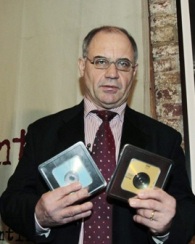
Details of Elmer’s discs may be “several weeks” away
 (CNS): The content of the discs reportedly containing the names of some 2,000 rich and famous individuals who, whistleblower Rudolf Elmer says, were using offshore centre to evade tax won’t be revealed for a few more weeks. Wikileaks founder, Julian Assange, who has promised full disclosure of the content, told the world’s media in London on Monday morning that because of the focus on other issues (namely its cache of some 250,000 diplomatic cables) it could be several weeks before Elmer’s discs are properly reviewed and posted on the website. However, Assange said that both the Financial Times and Bloomberg are possible candidates that could be given the information ahead of time.
(CNS): The content of the discs reportedly containing the names of some 2,000 rich and famous individuals who, whistleblower Rudolf Elmer says, were using offshore centre to evade tax won’t be revealed for a few more weeks. Wikileaks founder, Julian Assange, who has promised full disclosure of the content, told the world’s media in London on Monday morning that because of the focus on other issues (namely its cache of some 250,000 diplomatic cables) it could be several weeks before Elmer’s discs are properly reviewed and posted on the website. However, Assange said that both the Financial Times and Bloomberg are possible candidates that could be given the information ahead of time.
In a rare public appearance since his own arrest, the WikiLeaks boss said the files or parts of them may be given to the British government’s fraud investigators.
Elmer and Assange appeared together at a press conference in London at the Frontline Club ahead of Rudolf’s return to his native Switzerland, where he is to face trial for breaking that country’s secrecy laws and stealing information from Julius Baer, a Swizz based bank. However, the documents that Elmer is said to have taken from the bank and handed to Wikileaks in 2007 were taking from its Cayman Islands subsidiary, where Elmer was based for eight years before he was sacked in 2002.
On this latest disc Elmer claims there are details of the financial dealings of at least 40 politicians, among others, which he said he wanted to hand over to Wikileaks before he went on trial. At the press conference Elmer denied any wrongdoing and said he was on the side of right. The former Cayman based banker said he wanted people to know the truth about money concealed in offshore accounts.
“I do think, as a banker, I have the right to stand up if something is wrong," said Elmer, " "I have been there, I have done the job, I know what the day-to-day business is, I know how much is documented there and how much is not. I am against the system. I know how the system works and I know the day-to-day business. From that point of view, I wanted to let society know what I know. It is damaging our society."
Assange praised the former banker’s attempts to expose alleged shady practices in the financial industry.
Elmer’s former employers claim that he had embarked on a personal intimidation campaign and vendetta against Julius Baer. “He also used falsified documents and made death threats against employees,” the bank has stated.

Spain agrees not to call Cayman a “tax haven”
(CNS): The Spanish authorities will no longer consider the Cayman Islands as a tax haven once it signs a deal with the local government, officials said on Monday. Cayman has concluded negotiations for a tax information exchange agreement (TIEA) with Spain, following accord on several areas of common interest, the ministry of finance has revealed. It said a key outcome of the agreement that will take effect upon its entry into force will see Spain no longer classifying the Cayman Islands as a ‘tax haven’ under its domestic legislation.
“The conclusion of negotiations with Spain and the anticipated reclassification of the Cayman Islands under Spanish tax law represent significant progress in the Cayman Islands international tax transparency programme,” said Cayman Islands Premier and Minister of Finance, McKeeva Bush.
“Spain is also an EU member state and a G-20 country and therefore, Cayman’s agreement fulfils the objectives of our negotiation strategy, which is focused on concluding TIEAs with nations in these two groups.”
The agreement will now proceed through the necessary authorisationprocesses on both sides to allow it to be signed and enter into force, officials explained. The date and location for the signing will be confirmed in the coming months.
The Cayman Islands currently has signed 20 bilateral arrangements for the provision of tax information. In addition to Spain, the Cayman Islands currently has 7 agreements awaiting signature – Italy, Japan, India, Greece, Indonesia, South Africa, South Korea – and is in negotiations with many other countries of political and economic significance.

Cuba calls US measures positive, but far from enough
 (CNN): Cuba onSunday called President Barack Obama’s latest easing of travel restrictions to the island nation "positive" but accused Washington of continuing its policy of "destabilization." On Friday, the White House announced it would allow more academic, cultural and religious travel, non-family remittances and would pave the way for more airports to service flights to Cuba. "Although the measures are positive, they fall short of justified demands," Cuba’s Foreign Ministry said in a statement. "These measures confirm that there is no willingness to change the policy of blockade and destabilization against Cuba," it added, noting that the measures do nothing to alter the decades-old US trade embargo.
(CNN): Cuba onSunday called President Barack Obama’s latest easing of travel restrictions to the island nation "positive" but accused Washington of continuing its policy of "destabilization." On Friday, the White House announced it would allow more academic, cultural and religious travel, non-family remittances and would pave the way for more airports to service flights to Cuba. "Although the measures are positive, they fall short of justified demands," Cuba’s Foreign Ministry said in a statement. "These measures confirm that there is no willingness to change the policy of blockade and destabilization against Cuba," it added, noting that the measures do nothing to alter the decades-old US trade embargo.

IRS may ask US banks to disclose account-owners’ ID
 (Bloomberg): The Obama administration says US banks should disclose to the IRS bank accounts owned by foreigners, resurrecting a Clinton-era proposal that was opposed by banking groups and Republicans. The Internal Revenue Service proposed regulations Jan. 7 that would pave the way for the US for the first time to routinely share information with other governments about their citizens’ deposits in US financial institutions. The move is designed to help governments around the world pierce bank secrecy, the agency said. It follows a successful three-year effort by the US to pressure Switzerland and its biggest bank, UBS AG, to reveal the US owners of undeclared accounts held offshore.
(Bloomberg): The Obama administration says US banks should disclose to the IRS bank accounts owned by foreigners, resurrecting a Clinton-era proposal that was opposed by banking groups and Republicans. The Internal Revenue Service proposed regulations Jan. 7 that would pave the way for the US for the first time to routinely share information with other governments about their citizens’ deposits in US financial institutions. The move is designed to help governments around the world pierce bank secrecy, the agency said. It follows a successful three-year effort by the US to pressure Switzerland and its biggest bank, UBS AG, to reveal the US owners of undeclared accounts held offshore.
Murder re-trial opens following quashed conviction
(CNS): William McLaughlin-Martinez was due to return to the Grand Court on Monday morning to be tried for the second time for the murder of 20-year-old Brain Rankine-Carter, whose mutilated naked body was found in McField Square in George Town on 16 May 2008. McLaughlin-Martinez was convicted of the murder in July 2009. However, the conviction was squashed by the Cayman Islands Court of Appeal in August last year following an appeal. The appeals court found that a misdirection by the trial judge to the jury was enough to overturn the verdict and ordered a retrial. Martinez, who was serving a mandatory life sentence, has remained in jail on remand since the conviction was quashed.
A new jury was expected to be selected on Monday morning for the second trial, which will be presided over by Justice Charles Quin.
The key witness in the case remains Jason Hinds, aJamaican national who says he was with Martinez when the murder took palace. He was later convicted of accessory after the fact and was sentenced to three years in prison. However, he was released last year and deported.
The case will be prosecuted for a second time by Solicitor General Cheryll Richards QC and McLaughlin-Martinez will be represented by UK counsel, Mark Tomassi.
The crown’s case against the defendant, which has not altered, is that the victim was murdered by Martinez in an extremely violent attack after a drug deal went wrong. The murderer almost severed the head of the young man, who, according to forensic experts, had suffered more than 48 injuries that had been administered with a machete and something akin to an ice-pick.
The defence says the crown could not prove which one of the two men present that night was the murderer and which was the accessory. Although Martinez did not take the stand in his own defence, his counsel pointed to Hinds as the culprit.